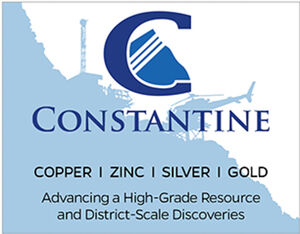China goes global to meet mineral needs
World Bank mining analyst says Far East nation has a pile of cash to meet the prolific mineral needs of its burgeoning economy
Last updated 6/26/2011 at Noon
DENVER - China may be poor in natural resources, but the country has enough cash to source its burgeoning need for minerals from foreign lands.
This was the message that Mamadou Barry, senior mining specialist in the Sustainable Energy Department of the World Bank brought to participants in the Mining Americas Summit 2011 held here June 13-14.
"China is a country of superlatives. In February China overtook Japan to become the second-largest economy in the world, and they are on there way to probably overtake the United States in the next 10 to 20 years, so that requires a lot of mineral consumption," the global mining analyst told the Summit audience June 13.
Barry, who has been involved with World Bank Group operations in the mining, oil, and gas sectors since 1993, cited copper as a prime example of the Far East country's mushrooming need for natural resources. He explained that China's rapid growth has catapulted it to the position of top global consumer of the red metal.
"An important share of those natural resources comes from abroad," he said.
The World Bank mining analyst said a very small portion of the global distribution of mineral resources such as copper and iron ore are found inside China's borders, and the reserves that are found there are of poor quality. What the Far East nation does have going for it, according to Barry, is it "is sitting on a pile of cash."
In April, China topped US$3 trillion in cash reserves.
"That is a lot of cash to go around and buy deposits everywhere they want to around the world," he said. "China can be defined as a resource-poor country - it is resource-poor and cash-rich."
Barry, who earned a Ph.D. in mineral economics from the Colorado School of Mines, told the summit-goers that China prefers to do business with countries on the opposite end of the spectrum -resource-rich and cash-poor - as it looks to meet its growing domestic demand for minerals.
Pocket governments
While China looks for opportunities to invest in mineral projects in developed countries such as Canada and Australia, Barry said the cash-rich country is oftentimes confronted with anti-Chinese sentiment and regulatory hurdles that it can bypass by dealing with the riskier frontier nations.
"They go to Zambia, or Zimbabwe or DRC (Democratic Republic of Congo)," he said. "We are talking about countries (that) western companies are not comfortable dealing with."
Utilizing its enormous surplus of cash, China can manage the governments of these nations that are desperately short on funds.
"They put huge amounts of money on the table; put in infrastructure and address government needs," Barry said.
The US$3.7 billion bid made by China Metallurgical Group Corp. and Jiangxi Copper Co. in 2007 to gain access to Aynak, Afghanistan's largest known copper deposit, is an example of the money Chinese companies are willing to bring to the table.
With the governments "in their pocket", the World Bank analyst said Chinese companies need not worry about interference from the ruling regimes while mining in developing nations; their primary concerns are protecting investments made in frontier nations from wars, civil disturbances and terrorism.
Foothold in Canada
Though China finds it more comfortable to work with cash-strapped nations in its search to fill its resources needs, the growing nation is willing to go anywhere opportunities exist.
"The Chinese are also following the natural resource endowment," Barry said. "Almost 75 percent of their resource investment is in Canada, Africa and Australia. That is because they need copper and iron ore most of the time and these countries offer this type of investment."
Chinese mining firms, which have established a stronghold in Africa through acquisitions, are just beginning to gain footing in Canada. The purchase of a large zinc-lead project in eastern Yukon Territory exemplifies this buyout strategy.
Jinduicheng Molybdenum Group and Northwest Nonferrous International Investment Co., two private Chinese companies, purchased a 100 percent interest in Yukon Zinc Corp. in 2008, thereby acquiring the Wolverine Project and other mineral assets in the Finlayson District of southern Yukon Territory.
Yukon Zinc began producing copper, lead and zinc concentrates at Wolverine in the latter half of 2010.
To gain access to deposits in developed countries, Chinese firms also have found it advantageous to forge partnerships with mining companies already doing business in the jurisdictions where the needed resources are located.
One such example is a rare 50-50 joint venture between Yunnan Chihong Zinc and Germanium Co. and Vancouver B.C.-based Selwyn Resources Ltd., forming Selwyn Chihong Mining Ltd. The objective of the Chinese-Canadian partnership is to develop the massive Selwyn Project as the world's next major zinc-lead mine, and Yunnan Chihong plowed C$100 million in the partnership to fund a bankable feasibility, which is expected to be completed in the second quarter of 2012.
"Chinese companies need western experience, and so they need these types of partnerships," Barry explained.
Mining companies from the Far East country are also listing on the stock exchanges of Canada, Australia and the United States.
"They (China's government officials) are encouraging Chinese companies to play the game, the same way western companies have done in terms of raising capital. The burden of raising capital now is falling squarely on the Chinese government and Chinese state-owned enterprises," Barry said.
TMX Group Head of Business Development Global Mining Orlee Wertheim affirmed, "In terms of what we are seeing at TSX (Toronto Stock Exchange), we actually are seeing a lot of Chinese companies listing on our venture market. I believe, in total on both exchanges, 7 percent of our market is what we consider Chinese mining companies."
One such example is Silvercorp Metals Inc., which trades on both the New York and Toronto stock exchanges.
Silvercorp is the largest primary silver producer in China through the operation of four silver-lead-zinc mines at the Ying Mining Camp in the Henan Province. It is also exploring the Silvertip silver-lead-zinc project in northern British Columbia. Applying an aggressive business plan it has exported from China, this Chinese-Canadian enterprise is working toward construction of a 200-metric-ton-per-day mine to develop the Silvertip's high-grade silver-lead-zinc resource.
"The approach is to get into production as fast as possible, build relationships with governments and the regulatory community and grow the mine over time," said Paul Wojdak, former geologist for the Northwest Region of British Columbia's Ministry of Energy, Mines and Petroleum Resources.
Barry said he expects to see more Chinese companies listing on the exchanges of developed nations such as Canada, Australia and the United States in order to raise money and explore these mineral-rich jurisdictions.
Chinese companies are also entering the realm of grassroots minerals exploration, an endeavor that poses risks not encountered by these firms when "buying" projects directly from governments.
But, according to Barry, the Chinese understand that opportunities go hand-in-hand with risks.
"There is a term in Chinese called weiji - a term that means risk also means opportunity," said the World Bank mining specialist. "They don't look too much at the risk - they see the opportunity to secure natural resources because for them, it is a national security issue. They want to become a developed country in the next decade or so; whatever it takes to do so, they are willing to do that."


















Reader Comments(0)